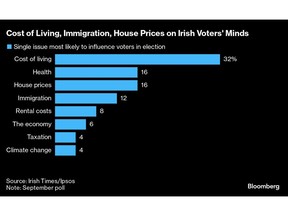Article content
(Bloomberg) — Ireland goes to the polls today in a vote that looks closer than previously expected after prime minister Simon Harris lost the momentum that motivated him to call the the snap general election just three weeks ago.

Ireland goes to the polls today in a vote that looks closer than previously expected after prime minister Simon Harris lost the momentum that motivated him to call the the snap general election just three weeks ago.

(Bloomberg) — Ireland goes to the polls today in a vote that looks closer than previously expected after prime minister Simon Harris lost the momentum that motivated him to call the the snap general election just three weeks ago.
Article content
Article content
Harris’s strong polling numbers since he became Taoiseach seven months ago, a slide in support for Sinn Fein, the main opposition, and a recent giveaway budget suggested it was the right time to call a vote. But his Fine Gael party has stumbled and is now neck and neck with Fianna Fail, its current coalition partner and Sinn Fein.
Advertisement 2
This advertisement has not loaded yet, but your article continues below.
THIS CONTENT IS RESERVED FOR SUBSCRIBERS ONLY
Subscribe now to read the latest news in your city and across Canada.
SUBSCRIBE TO UNLOCK MORE ARTICLES
Subscribe now to read the latest news in your city and across Canada.
REGISTER / SIGN IN TO UNLOCK MORE ARTICLES
Create an account or sign in to continue with your reading experience.
THIS ARTICLE IS FREE TO READ REGISTER TO UNLOCK.
Create an account or sign in to continue with your reading experience.
or
Article content
The most likely government after the election remains a repeat alliance of the centrist parties, polls show. Still, after more than 13 years in power, Fine Gael has struggled to sell itself to voters frustrated with the cost of living, housing shortages and a long-running healthcare crisis.
On top of that, an increase in anti-immigrant sentiment in Ireland and a backlash against asylum seekers has drawn support to newer parties and some independent candidates.
“People are changing their mind a lot at election campaigns and that’s the story of the last three elections and it’s the same all across Europe,” said Theresa Reidy, a senior lecturer in politics at University College Cork. “Those old enduring connections between voters and parties just aren’t there anymore, and the campaign matters a lot.”
Tight Race
Polling stations will open from 7 a.m. to 10 p.m. Dublin time, and there will be an exit poll after voting closes.
Counting will start Saturday morning, with the first results expected over the following hours. The full count may take a number of days.
Harris’s election campaign was beset with slip-ups, the worst a viral video of him walking away from a disability care worker and dismissing her view that the government wasn’t doing enough. Harris later apologized.
Top Stories
Get the latest headlines, breaking news and columns.
By signing up you consent to receive the above newsletter from Postmedia Network Inc.
Thanks for signing up!
A welcome email is on its way. If you don’t see it, please check your junk folder.
The next issue of Top Stories will soon be in your inbox.
We encountered an issue signing you up. Please try again
Article content
Advertisement 3
This advertisement has not loaded yet, but your article continues below.
Article content
The 38-year-old may still secure enough support to form a new coalition, but it’s not the situation he had hoped for. Fine Gael has slumped in recent weeks and there’s just two percentage points between the three main parties, according to an Irish Times/Ipso B&A poll published Monday.
A separate survey from Red C showed a similarly tight race. A lot will depend on undecided voters, which the Irish Times put at 19%.
The most likely government after the election remains a coalition between Fine Gael and Fianna Fail, led by one of the party’s leaders, Harris or Micheal Martin. But the parties, which between them have led every government since the state was formed 100 years ago, are likely to need the support of a third party or a group of independents.
Sinn Fein’s steady rise over in the last decade has created a formidable challenge to the century-long status quo. Despite slipping in polls since 2023, it’s built a solid base of support by focusing on problems around housing and infrastructure that have haunted Ireland since the 2008 housing and banking crash.
But the party, the one time political wing of the Irish Republican Army, is unlikely to get enough support to be able to form the next government. Both Fine Gael and Fianna Fail have ruled out a partnership with it.
Advertisement 4
This advertisement has not loaded yet, but your article continues below.
Article content
In a television debate this week, Sinn Fein leader Mary Lou McDonald accused Martin’s party of causing the country’s financial crisis and blamed Harris’s for the austerity that followed.
Harris has tried to reinvigorate Fine Gael’s image since he became leader in April, promising “new energy.”
A month before he called the election, the government gifted voters a slew of tax cuts and spending increases in October’s budget, made possible by what’s forecast to be a record €38 billion ($40 billion) in corporate tax receipts.
One growing concern is that Ireland’s current tax boom could be undone by US policy changes under Donald Trump.
In response, Harris has pointed to plans to stow away money in a new sovereign wealth fund while still giving voters what they want.
“The next chapter, the next five years, the government I want to lead has to now be about looking at the costs that families face every day, that businesses face,” Harris said in the final debate on national broadcaster RTE. “Now is not the time to run the country on a national credit card.”
Article content
Share this article in your social network